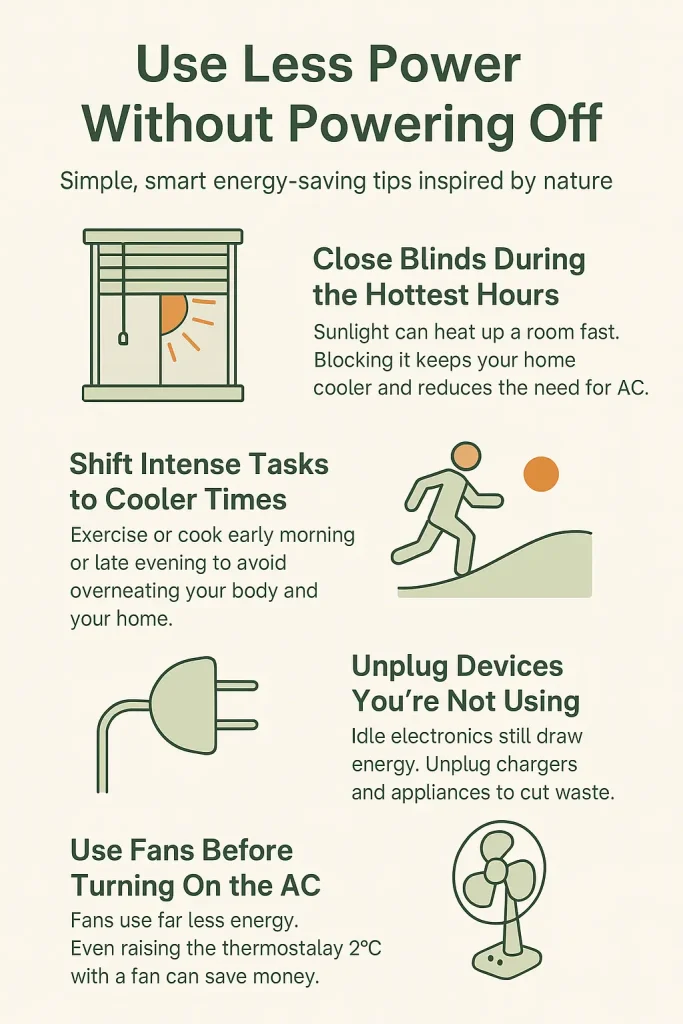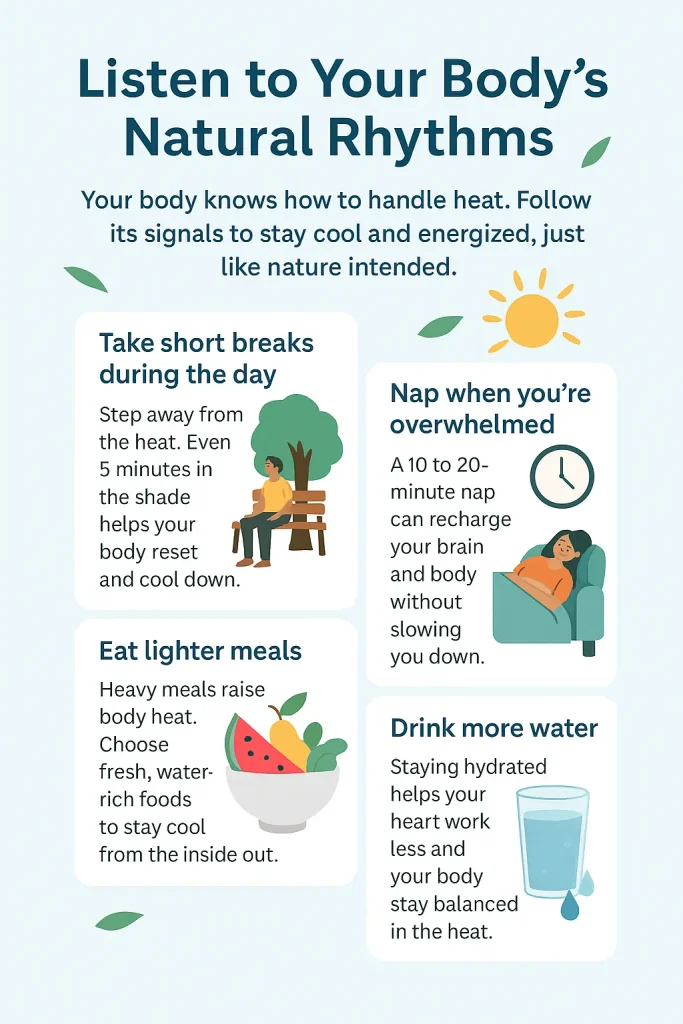What a Bat Can Teach You About Saving Energy This Summer
It’s one of nature’s smartest tricks and it could help you handle heatwaves, cut energy bills, and protect your well-being.
In the forests of Madagascar, there’s a tiny bat doing something no one expected.
Instead of using energy to cool down in the heat, this bat, called Triaenops menamena, does the opposite. It stays warm on purpose while dropping its energy use to almost nothing. Scientists call this hot torpor. Think of it like sleep mode on your laptop, but in real life.
This discovery came from a study by biologist Sina Remmers from the University of Hamburg. Her research showed that animals don’t always wait for evolution to catch up. They adapt on the fly, day by day.
That’s not just cool science. That’s a survival hack.
And here’s the best part. We can use it too.
What Is Hot Torpor and Why It Matters to You
Normally, when animals want to save energy, they cool down. That’s called cold torpor. But in hot, dry places, cooling down doesn’t always help. So this bat invented a new way to survive:
Hot Torpor = Stay warm + Use less energy
It sounds simple, but it’s revolutionary. While the bat stays alert and warm, it burns almost no energy, up to 95 percent less than usual.
So, how does this help you?
It’s a reminder that small changes in behavior can save big energy in our bodies, in our homes, and in our lives.
Real-Life Energy Tricks Inspired by Bats
Let’s break this down. What can we learn from the bat’s smart survival move? Here’s how you can use hot torpor thinking in everyday life.

1. Use Less Power Without Powering Off
Just like the bat doesn’t go cold, you don’t need to shut down your life. But you can switch to low-energy modes that help you stay active while saving energy. Here’s how it works:
- Close blinds during the hottest part of the day to keep rooms cool: Sunlight streaming through windows can increase indoor temperatures by several degrees. Closing blinds blocks radiant heat, reducing the need for air conditioning and keeping your space naturally cooler.
- Shift intense tasks like workouts or cooking to cooler times. Your body produces heat when you exert yourself. Doing high-energy activities during the hottest hours raises your internal temperature and makes you sweat more. Early mornings or evenings are cooler, helping your body stay in balance.
- Unplug devices you’re not using. They still draw energy. Many electronics use what’s called phantom energy or standby power even when they’re off. Unplugging chargers, TVs, and game consoles when idle can cut energy waste and lower your electricity bill.
- Use fans before switching on the AC. Even 2 degrees higher saves money. Fans use much less energy than air conditioners. They help move air across your skin, making you feel cooler even if the room isn’t. Raising your thermostat by just 2 degrees Celsius and using fans instead can reduce energy use without sacrificing comfort.
These small changes may seem simple, but over time, they make a big difference. Just like the bat’s moment-by-moment energy-saving strategies in the wild.
2. Listen to Your Body’s Natural Rhythms
On hot days, your body sends clear signals. Slow down, cool off, rest more. That’s not weakness. It’s biology. Just like the bat uses hot torpor to stay efficient, we can listen to our bodies and adjust for better energy use and well-being.

- Take short breaks during the day. Heat makes your body work harder to stay cool. Short breaks, especially in shade or cool areas, help lower your core temperature and reduce the risk of heat exhaustion. Even a 5-minute pause can reset your system.
- Nap when you’re overwhelmed. Your brain and body need downtime to recover. A short nap, 10 to 20 minutes, can boost focus, restore energy, and prevent burnout. It’s like your own quick recharge.
- Eat lighter meals to avoid overheating from digestion. Digesting heavy meals raises your body temperature. Light, water-rich foods like fruits and vegetables are easier on your system and help you stay cool from the inside out.
- Drink more water. Dehydration drains energy. Dehydration thickens your blood, slows circulation, and forces your heart to work harder. Drinking water regularly helps your body regulate temperature and use energy more efficiently.
These aren’t just health tips. They’re real strategies for surviving and thriving in heat, inspired by how animals adapt in nature.
3. Practice Mental Torpor for Burnout Prevention
The bat lowers its metabolism to save energy. You can do something similar for your mind, especially when life gets overwhelming.
Modern life constantly pushes us to stay connected, think fast, and keep going. But mental energy runs out too. Here’s how to conserve it:

- Two-minute quiet time without screens or sounds. This gives your brain a reset. Just two minutes of silence can calm your nervous system, reduce stress hormones, and improve focus. Try it after a Zoom meeting or when switching tasks.
- Deep breathing when your brain feels too full. Simple breathwork, like 4 seconds in, 4 seconds out, activates your parasympathetic system, your body’s natural calming switch. It’s like clicking refresh on your thoughts.
- Mindful pauses between tasks. Instead of jumping from one thing to the next, take a moment to stretch, look out a window, or take 10 slow breaths. These mini-pauses stop your mental engine from overheating.
Think of this as hot torpor for your brain. A way to stay functional, alert, and creative without burning out.
Final Reflection: Live Like the Bat
The bat didn’t just survive the heat. Instead, it adapted with precision. Rather than running or shutting down, it found a smart middle path, staying alert, conserving energy, and riding out the extremes.
You can do the same.
In a world that constantly asks for more, more speed, more output, more energy, the smartest move isn’t always pushing harder. Sometimes, it’s adjusting. Being efficient. Knowing when to slow down to last longer.
So next time you feel drained in the summer heat, overwhelmed at work, or just out of rhythm, remember the bat’s secret:
You don’t need to go cold. You just need to go smart.
Action Step: Try This Today
- Close your blinds before the heat kicks in
- Unplug unused devices
- Use fans first, then AC
- Drink more water and eat light
- Schedule a mindful pause during the day
Even one of these changes can help you feel better, think clearer, and live more efficiently without sacrificing momentum.
TL;DR
A bat in Madagascar survives extreme heat by staying warm and using less energy. This strategy, called hot torpor, offers real-life inspiration for saving energy and staying sharp during hot or stressful times. Try it for your body, your mind, and your home.






